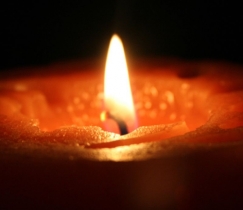 I have something to confess, a sin of omission. It’s something that’s been on my mind off and on for the past sixty years. This sin of omission really weighed heavily on my conscience for the first year or two. Now it just comes to mind occasionally.
I have something to confess, a sin of omission. It’s something that’s been on my mind off and on for the past sixty years. This sin of omission really weighed heavily on my conscience for the first year or two. Now it just comes to mind occasionally.
It happened when I was a little girl. I don’t remember exactly how old I was, probably about 6. I was at my grandma’s house. She was hosting a “Stanley Party.” There were lots of older women, probably about a dozen, in her living room. I knew most of them as being the grandmas from church.
A “Stanley Party” was kind of like a “Tupperware Party” only the products were “Stanley Home Products” – mostly household cleaners.
The company still exists: http://www.shponline.com/english/about.asp

For the first hour of the party the “Stanley Lady” demonstrated the products and the women wrote up their orders. Then the hostess, my grandma on this day, brought out dessert and coffee for all the women, and everyone sat around and talked for a long time. I remember sitting on the floor in the living room, near the door to the hallway that went outside. I think I was coloring in a coloring book. I remember it was very noisy in the room. Everyone was talking, laughing, and enjoying being together.
It was snowing outside, and just beginning to get dark. Stella Lillesand, a really old lady who had been my mother’s Sunday School teacher when she was little, decided to leave the party first. Stella had to walk two long blocks to get to her home from my grandma’s house, and she thought the snow might make walking more difficult, especially as it got darker. Shortly after she left, I thought I heard an awful noise, like someone screaming. No one else seemed to hear it. I kept coloring, but then I heard the noise again. Was someone outside yelling? I looked around at all the women in the room. Everyone was talking, and no one else seemed to be hearing what I thought I heard. I was kind of afraid. I colored some more, and tried to forget about those awful noises. Maybe I wasn’t really hearing anything.
About half an hour later, someone else decided to leave the party. After saying her good-byes, she walked out the door. Less than a minute later, she came running back in, all excited. She had found Stella on the sidewalk, moaning in pain. My grandma called an ambulance, and Stella was taken to the hospital. She had slipped on the sidewalk right outside my grandma’s house, fallen, and broken her hip. That awful noise I had been hearing for the past half-hour was Stella crying for help. Oh, why hadn’t I told someone. I felt so bad. Today is the first day in sixty years that I’ve mentioned this “sin of omission” to anyone.
Why am I finally confessing it today? For some unknown reason, the whole incident came to mind again last week. I don’t know why.
And then Sunday afternoon Mim and I went to a Madison Symphony Orchestra concert. Overall, the concert was wonderful – one of the most enjoyable concerts I’ve been to in a long time. It was an unusually varied concert that included works by Jean Sibelius, Joseph Haydn, Alexander Arutiunian, and Richard Strauss.
 Right in the middle of the concert was a work by John Adams called “Doctor Atomic Symphony,” composed in 2007. It was 25 minutes of frenzied agitation, loud mechanical crashes, and brash fanfares – all evoking both terror and sadness. The three movements are named, The Laboratory, Panic, and Trinity. “Doctor Atomic” refers to J. Robert Oppenheimer, the physicist who led the Manhattan Project in 1945 to create the first atomic bomb. The Madison Symphony Orchestra’s program description of the work quotes from the Hindu Bhagavad Gita, which was referenced by Oppenheimer following the first atomic bomb test, “Now I am become death, the destroyer of worlds.” The audience listening to the work Sunday afternoon couldn’t help but feel the heavy, heavy remorse of the scientists who carried out this horrible test of the atomic bomb, as they gradually realized the potential of the terror-filled monstrosities they were enabling.
Right in the middle of the concert was a work by John Adams called “Doctor Atomic Symphony,” composed in 2007. It was 25 minutes of frenzied agitation, loud mechanical crashes, and brash fanfares – all evoking both terror and sadness. The three movements are named, The Laboratory, Panic, and Trinity. “Doctor Atomic” refers to J. Robert Oppenheimer, the physicist who led the Manhattan Project in 1945 to create the first atomic bomb. The Madison Symphony Orchestra’s program description of the work quotes from the Hindu Bhagavad Gita, which was referenced by Oppenheimer following the first atomic bomb test, “Now I am become death, the destroyer of worlds.” The audience listening to the work Sunday afternoon couldn’t help but feel the heavy, heavy remorse of the scientists who carried out this horrible test of the atomic bomb, as they gradually realized the potential of the terror-filled monstrosities they were enabling.
Francois Rabelais (1483-1553), a writer of the French Renaissance, understood the relationship between conscience and scientific advancement centuries ago when he wrote, “Science without conscience is the death of the soul.”
A more contemporary Frenchman, Albert Camus (1913-1960), added, “A guilty conscience needs to confess. A work of art is a confession.” I guess that was the role of the “Doctor Atomic Symphony” – to put the confession of our atomic scientists into a form that could be understood and felt by the audience. I’m glad I had the opportunity to hear the “Doctor Atomic Symphony” but I’m really thankful that the rest of the concert included music that was much more pleasant and uplifting to hear.
 What do the regrets of a six-year-old and the remorse of the team of scientists who developed the atomic bomb have in common? Conscience. That special gift God gave to all of us.
What do the regrets of a six-year-old and the remorse of the team of scientists who developed the atomic bomb have in common? Conscience. That special gift God gave to all of us.
George Washington’s 282nd birthday comes up on Saturday. He gave us some advice about conscience:
Labor to keep alive in your breast that little spark of celestial fire called conscience.


Leave a comment